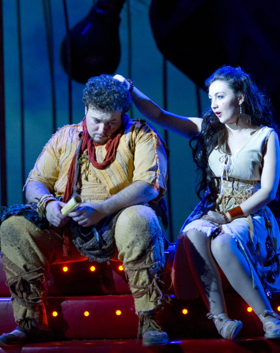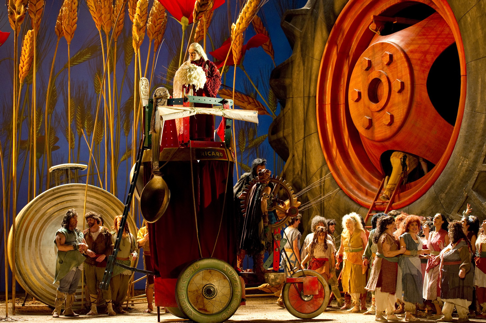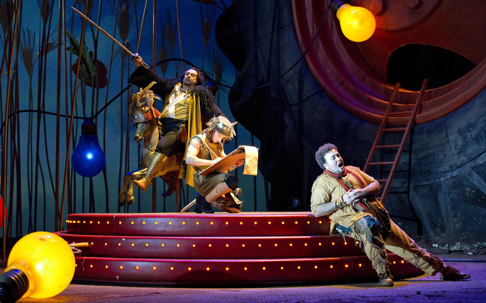
04 Mar 2014
Elisir d’amore in Monte-Carlo
Will wonders never cease? Wheat stalks 6 meters high? Rats 2 meters tall. Setting Donizetti’s little comedy amidst biological mutations engendered by Chernobyl does seem a bit farfetched.
English Touring Opera are delighted to announce a season of lyric monodramas to tour nationally from October to December. The season features music for solo singer and piano by Argento, Britten, Tippett and Shostakovich with a bold and inventive approach to making opera during social distancing.
This tenth of ten Live from London concerts was in fact a recorded live performance from California. It was no less enjoyable for that, and it was also uplifting to learn that this wasn’t in fact the ‘last’ LfL event that we will be able to enjoy, courtesy of VOCES8 and their fellow vocal ensembles (more below …).
Ever since Wigmore Hall announced their superb series of autumn concerts, all streamed live and available free of charge, I’d been looking forward to this song recital by Ian Bostridge and Imogen Cooper.
The Sixteen continues its exploration of Henry Purcell’s Welcome Songs for Charles II. As with Robert King’s pioneering Purcell series begun over thirty years ago for Hyperion, Harry Christophers is recording two Welcome Songs per disc.
Although Stile Antico’s programme article for their Live from London recital introduced their selection from the many treasures of the English Renaissance in the context of the theological debates and upheavals of the Tudor and Elizabethan years, their performance was more evocative of private chamber music than of public liturgy.
In February this year, Albanian soprano Ermonela Jaho made a highly lauded debut recital at Wigmore Hall - a concert which both celebrated Opera Rara’s 50th anniversary and honoured the career of the Italian soprano Rosina Storchio (1872-1945), the star of verismo who created the title roles in Leoncavallo’s La bohème and Zazà, Mascagni’s Lodoletta and Puccini’s Madama Butterfly.
Evidently, face masks don’t stifle appreciative “Bravo!”s. And, reducing audience numbers doesn’t lower the volume of such acclamations. For, the audience at Wigmore Hall gave soprano Elizabeth Llewellyn and pianist Simon Lepper a greatly deserved warm reception and hearty response following this lunchtime recital of late-Romantic song.
Collapsology. Or, perhaps we should use the French word ‘Collapsologie’ because this is a transdisciplinary idea pretty much advocated by a series of French theorists - and apparently, mostly French theorists. It in essence focuses on the imminent collapse of modern society and all its layers - a series of escalating crises on a global scale: environmental, economic, geopolitical, governmental; the list is extensive.
For this week’s Live from London vocal recital we moved from the home of VOCES8, St Anne and St Agnes in the City of London, to Kings Place, where The Sixteen - who have been associate artists at the venue for some time - presented a programme of music and words bound together by the theme of ‘reflection’.
'Such is your divine Disposation that both you excellently understand, and royally entertaine the Exercise of Musicke.’
Amongst an avalanche of new Mahler recordings appearing at the moment (Das Lied von der Erde seems to be the most favoured, with three) this 1991 Mahler Second from the 2nd Kassel MahlerFest is one of the more interesting releases.
‘And there was war in heaven: Michael and his angels fought against the dragon; and the dragon fought and his angels, And prevailed not; neither was their place found any more in heaven … that old serpent … Satan, which deceiveth the whole world: he was cast out into the earth, and his angels were cast out with him.’
If there is one myth, it seems believed by some people today, that probably needs shattering it is that post-war recordings or performances of Wagner operas were always of exceptional quality. This 1949 Hamburg Tristan und Isolde is one of those recordings - though quite who is to blame for its many problems takes quite some unearthing.
There was never any doubt that the fifth of the twelve Met Stars Live in Concert broadcasts was going to be a palpably intense and vivid event, as well as a musically stunning and theatrically enervating experience.
‘Love’ was the theme for this Live from London performance by Apollo5. Given the complexity and diversity of that human emotion, and Apollo5’s reputation for versatility and diverse repertoire, ranging from Renaissance choral music to jazz, from contemporary classical works to popular song, it was no surprise that their programme spanned 500 years and several musical styles.
The Academy of St Martin in the Fields have titled their autumn series of eight concerts - which are taking place at 5pm and 7.30pm on two Saturdays each month at their home venue in Trafalgar Square, and being filmed for streaming the following Thursday - ‘re:connect’.
The London Symphony Orchestra opened their Autumn 2020 season with a homage to Oliver Knussen, who died at the age of 66 in July 2018. The programme traced a national musical lineage through the twentieth century, from Britten to Knussen, on to Mark-Anthony Turnage, and entwining the LSO and Rattle too.
With the Live from London digital vocal festival entering the second half of the series, the festival’s host, VOCES8, returned to their home at St Annes and St Agnes in the City of London to present a sequence of ‘Choral Dances’ - vocal music inspired by dance, embracing diverse genres from the Renaissance madrigal to swing jazz.
Just a few unison string wriggles from the opening of Mozart’s overture to Le nozze di Figaro are enough to make any opera-lover perch on the edge of their seat, in excited anticipation of the drama in music to come, so there could be no other curtain-raiser for this Gala Concert at the Royal Opera House, the latest instalment from ‘their House’ to ‘our houses’.
"Before the ending of the day, creator of all things, we pray that, with your accustomed mercy, you may watch over us."

Will wonders never cease? Wheat stalks 6 meters high? Rats 2 meters tall. Setting Donizetti’s little comedy amidst biological mutations engendered by Chernobyl does seem a bit farfetched.
Actually it was not Chernobyl, the tip-off being the 7 meters diameter tractor wheel, mud hanging off of the lower treads. Then a thrown-away tuna fish can crashed onto the stage and rolled center, from which emerged Belcore with the old trick of how many whatever-they-weres could possibly emerge from a tuna fish can. We indeed had delighted smiles on our faces.
This was the lilliputian Elisir d’amore! Tiny, magical creatures acted out this bit of sentimental commedia del’arte residue underneath a wheat field somewhere in Switzerland (the production comes from Lausanne). Given it was magical the Belcore creature was part Samurai (the wig) and part Swiftian general. Dulcamara arrived atop a contraption that was totally fantastic, maybe a sort of rolling still though he seemed some sort of crazed Swiftian magistrate in his red robe and weird wig.
It was a splendidly realized concept. The slender wheat stalks could actually be scaled, and were by five or so acrobats evoking wonder amongst us spectators. For some reason there was a boy and girl, eight year olds maybe, who rushed on stage from time to time to act out bits of puppy love. Besides the rats, birds as well as a life sized horse, i.e. about ten meters high (all we could see were the legs), meandered across the back of the stage usually during the arias and duets — the wonders of very skillful projections.
 Dulcamara atop his wagon, tuna fish can, tire and wheat. Photo courtesy of the Opéra de Monte-Carlo
Dulcamara atop his wagon, tuna fish can, tire and wheat. Photo courtesy of the Opéra de Monte-Carlo
What, you may ask, has all this to do with Donizetti’s opera? The answer is nothing. It was an extravaganza of concept and hard-headed exploitation of contemporary digital techniques. Placed on the stage by a team of Italians, stage director Adriano Sinivia, set designer Christian Taraborrelli, and costume designer Enzio Iorio this was a stand alone theater piece that used a bel canto masterpiece as an excuse to imagine a far-fetched digital video game.
Donizetti’s opera is neither a fairytale for children with hidden meanings for adults nor a Swiftian satire of rural morality. It is a simple love story told very directly — love overcomes all obstacles if you sing well enough and long enough. Actually the cast assembled by the Opéra de Monte-Carlo did sing well enough but even so could not overcome the obstacle of this production. It was a long evening that left us indifferent to all this sophisticated human talent and effort.
While the Opéra de Monte-Carlo had the esteemed Orchestre Philharmonique de Monte-Carlo in the pit it had French contralto Nathalie Stulzmann on the podium who had not a clue about bel canto musicality — a musicality that allows time to stand still so you can elegantly feel how you feel. Define it how you may it will never be driving the music hard and fast with an authority that is above that of the singers. Musically the evening was a willful display of conductorial insensitivity.
 George Petean as Belcore, Stefan Pop as Nemorino. Photo courtesy of the Opéra de Monte-Carlo
George Petean as Belcore, Stefan Pop as Nemorino. Photo courtesy of the Opéra de Monte-Carlo
It is enlightening to know that Angela Gheorghiu is not the only singer to come out of Romania. The Opéra de Monte-Carlo found three more excellent artists. Twenty-eight year-old tenor Stefan Pop made a roly poly Nemorino who gave a skillful account of his aria — maybe the only moment of the evening not sabotaged by directorial gloss — and in general convincingly portrayed a country bumpkin with a sophisticated vocal technique. Baritone George Petean was a roly poly Belcore who gave it his all though it seemed too much, fault maybe of his silly wig or his feeling that his was a hopeless character in this lilliputian satire so he had to try to make something of it. Bass Adrian Sampetrean on the other hand rose above his ridiculous wig and assumed a genuine authority that you probably do not want from this shyster, fault maybe of the conductress who did not try to reign him in to become Donizetti’s charming con man.
Italian ingenue soprano Mariangela Sicilia was the spunky, too spunky Adina who sang quite well, though her knowing attitude and knowing vocal technique is not yet finished to the degree that she can settle with confidence into character and sail securely above it all with unflappable technique. It will come. The Giannini of Parisian soprano Vannina Santoni was a larger than usual character and an appreciated component of the larger ensembles.
It was unclear whether the generous applause was relief that it was over, appreciation of good singing, or evidence that the Monegasques (those who reside in Monaco) are willing to reward even bad conducting.
Michael Milenski
Casts and production information:
Adina: Mariangela Sicilia; Nemorino: Stefan Pop; Belcore: George Petean; Dulcamara: Adrian Sampetrean; Giannetta: Vannina Santoni. Chorus of the Opéra de Monte-Carlo and Orchestre Philharmonique de Monte-Carlo. Conductor: Nathalie Stutzmann; Mise en scène: Adriano Sinivia; Scenery: Christian Taraborrelli; Costumes: Enzo Iorio; Lighting: Fabrice Kebour. Salle Garnier, Monte-Carlo, February 26, 2014.